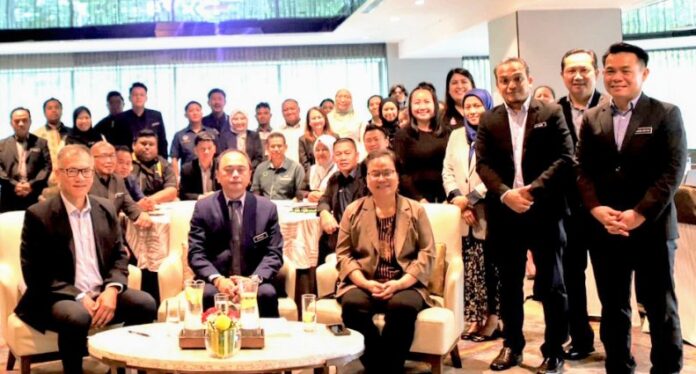Stanley (seated, middle), Dr. Henry Chan, Conservation Director, WWF-Malaysia (left) and Dr. Robecca Jumin, Associate Director – Sabah, WWF-Malaysia; in a group photo with all the participants.
KOTA KINABALU : – Addressing plastic pollution is crucial for protecting biodiversity, preserving vital ecosystems and safeguarding human health, said Local Government and Housing Ministry (KKTP) Deputy Permanent Secretary I Stanley Chong.
He said plastic pollution poses severe threats to both ecosystems and human health.
“Marine species, like dolphins and sea turtles, suffer from ingesting or getting entangled in plastic, often leading to malnutrition or death, ” he said .
Coral reefs and mangroves are also harmed, with plastic debris increasing disease vulnerability and suffocating plant life.
“Beyond marine life, microplastics contaminate human food and water, potentially causing various diseases.”
“We must take collective action to combat this growing environmental threat,” he said when officiating the opening of the Plastic Inception Workshop here today.
The workshop was jointly organised by KKTP and WWF-Malaysia to address plastic pollution and create a sustainable future for Sabah.
Its main purpose was to unite key government agencies and stakeholders and create a platform to share insights and expand our understanding of the identified critical gaps in plastic waste management.
“The workshop is meant to discuss and propose actionable recommendations and solutions to bridge these gaps and improve plastic waste management across Sabah.
Every participation is crucial, as expertise, perspectives and feedback will play a pivotal role in shaping the necessary strategies to tackle this escalating plastic pollution issue,” he said.
He strongly encouraged all representatives from the local authorities (PBTs) to identify the specific challenges and gaps in their respective districts and bring them to the forefront of the discussions.
“Together, we can explore sustainable and impactful solutions that will pave the way for a cleaner, healthier future for Sabah.”
He also hopes that the workshop’s insights and recommendations will serve as a solid foundation for more concrete and sustainable actions moving forward.

